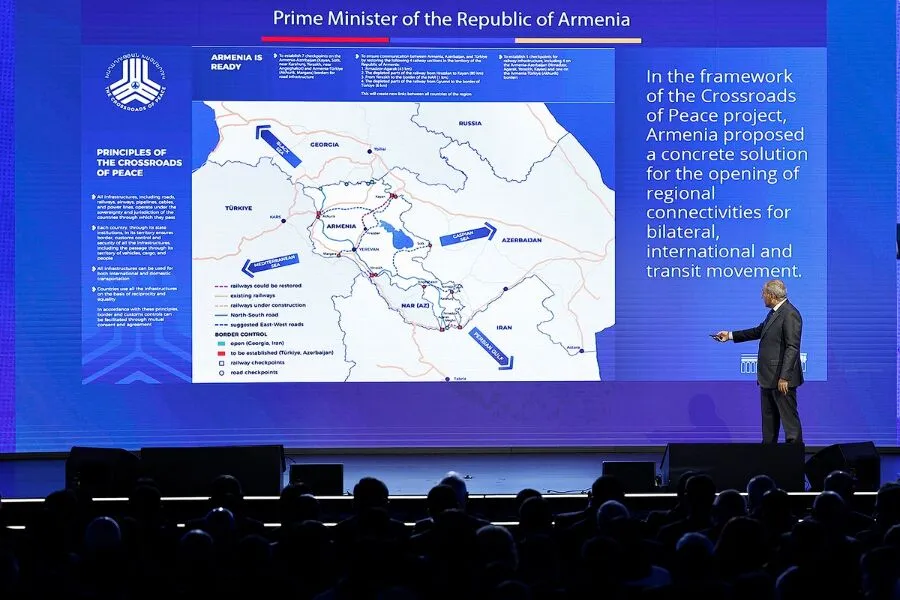The fragile peace process between Armenia and Azerbaijan has entered a critical phase, with both governments exchanging pointed statements over constitutional amendments, territorial claims and the future of regional cooperation.
Speaking to reporters today, Azerbaijan’s Deputy Foreign Minister Yalchin Rafiyev emphasized the need for “practical actions” over rhetoric. “There are two important conditions for signing a peace agreement. Concrete steps must be taken [by Armenia] to fulfill these conditions. That is, instead of any calls for peace, practical actions are needed,” Rafiyev said.
Tensions escalated following Armenian Prime Minister Nikol Pashinyan’s remarks on May 26 at the “Yerevan Dialogue 2025” international forum. Pashinyan stated he would initiate constitutional amendments if Armenia’s Constitutional Court deems the proposed peace treaty with Azerbaijan incompatible with the current legal framework. “This peace process and peace treaty must not be missed,” he stressed. “We will work to convince the public that such changes are necessary to achieve lasting and sustainable peace.”
Read also
In Baku, Azerbaijani President Ilham Aliyev has once again invoked the notion of “Western Azerbaijan,” asserting that Azerbaijanis are being erased from their ancestral territories—referring to the Republic of Armenia. He accused Yerevan of pursuing “a systematic policy aimed at eliminating the Azerbaijani people’s material and spiritual heritage.”
Aliyev also endorsed the Caucasus Muslims Office’s move to open an “Irevan Qaziyyat” branch in Yerevan, calling it “an important step toward restoring historical justice.”
National Assembly Speaker Alen Simonyan downplayed Azerbaijan’s assertive rhetoric, framing Baku’s statements as reactions rather than provocations. Speaking to reporters in parliament, Simonyan described Azerbaijan’s messaging as a “mirror response” to decisions made by Artsakh leadership. “When representatives in Karabakh elect a president and issue statements, isn’t that a form of territorial assertion?” he asked. “We ignore that, but react strongly when Azerbaijan responds.”
He argued that references to Nagorno-Karabakh by Armenian leadership inevitably invite counterclaims from Baku. “If we say ‘Karabakh,’ Aliyev responds with ‘Western Azerbaijan,’” Simonyan said, suggesting a pattern of reciprocal rhetoric. When asked whether he believed such parallels were valid, he replied, “Of course.”
When a journalist noted that Baku used the term “Western Azerbaijan” even prior to the latest events in Artsakh, Simonyan insisted that both sides react to each other’s narratives.
Pashinyan, however, rejected Aliyev’s statement, declaring: “There is no—and cannot be—a ‘Western Azerbaijan’ on the sovereign territory of the Republic of Armenia.” He called such discussions unacceptable and legally unfounded. Pashinyan also pointed to territorial claims against Armenia in Azerbaijan’s own constitution, but said Armenia has not made it a primary issue, assuming it would be addressed in the final peace agreement.
Azerbaijan’s Ministry of Foreign Affairs reacted swiftly. Spokesperson Aykhan Hajizadeh stated that Pashinyan’s remarks reveal “Yerevan’s unwillingness to amend its Constitution to eliminate territorial claims against Azerbaijan and resolve existing issues in the peace process,” raising “questions about Armenia’s overall commitment to peace.”
Hajizadeh further criticized Armenia’s position on the OSCE Minsk Group, which Azerbaijan wants formally dissolved. “By ignoring calls for the formal dissolution of the Minsk Group, Armenia reveals manipulative intentions—implying that the conflict remains unresolved, and that it should now shift to Armenian territory,” he said.
Pashinyan, however, maintained that Armenia’s stance is guided by a genuine desire for peace. “There will be no war between Armenia and Azerbaijan. There will be peace—and that is absolutely clear to me,” he said.
He also presented Armenia’s official proposal to open a transport corridor through Armenian territory connecting mainland Azerbaijan with Nakhichevan. The plan includes regulated railway travel with passport and customs checks. “We support mutual connectivity: Azerbaijan to Azerbaijan [through Armenia], and Armenia to Armenia [through Azerbaijan],” Pashinyan said, underscoring the need for respect of territorial sovereignty.
Foreign Minister Ararat Mirzoyan echoed these sentiments at the international forum. He stated that Armenia’s regional vision prioritizes normalization with Azerbaijan and Turkey based on mutual respect for sovereignty. “Peace does not come easy; it is advanced by courageous diplomacy and trust-building,” he said.
Mirzoyan also reaffirmed Armenia’s readiness to host the next ministerial meeting within the “3+3” regional cooperation format—an offer first made during the platform’s third session in Istanbul in October 2024. In a written response to Sputnik Armenia, the Armenian Ministry of Foreign Affairs confirmed that the country is prepared to organize the upcoming meeting.
Earlier in May, Russian ambassador to Armenia Sergey Kopyrkin stated that the next “3+3” meetings are expected to take place in Yerevan and Baku, per an agreement among participating countries.
“The Armenian side declared its readiness to host the next ministerial meeting back on October 18, 2024, during the third session of the ‘3+3’ platform held in Istanbul,” the Foreign Ministry noted in its official response.
The ministry added that the date and venue of the next session will be announced once consensus is reached.
The “3+3” initiative—bringing together Armenia, Azerbaijan, Georgia, Iran, Russia and Turkey—was launched in late 2020 as a platform for regional dialogue and cooperation. Although Georgia has so far opted out, three meetings have been held under this format.
While leaders continue to speak the language of peace, “tensions remain around Armenia’s Syunik region,” Russian Defense Minister Andrey Belousov said today, without elaborating. Despite the fragile situation on the ground, Minister Belousov stated that Russia remains invested in the peace process and is ready to do “everything possible” to support the signing of a treaty between Yerevan and Baku.
His comments follow earlier remarks by Russian Foreign Minister Sergey Lavrov, who expressed Moscow’s “sincere wishes for success” to both countries in pursuing lasting peace. Lavrov emphasized Russia’s readiness to assist with negotiating, drafting and signing a comprehensive agreement.
The sustained tension in southern Armenia contrasts sharply with diplomatic assurances from key stakeholders. As local communities in Syunik continue to face uncertainty, the path to peace depends heavily on the ability to protect the border.
Hoory Minoyan




















































